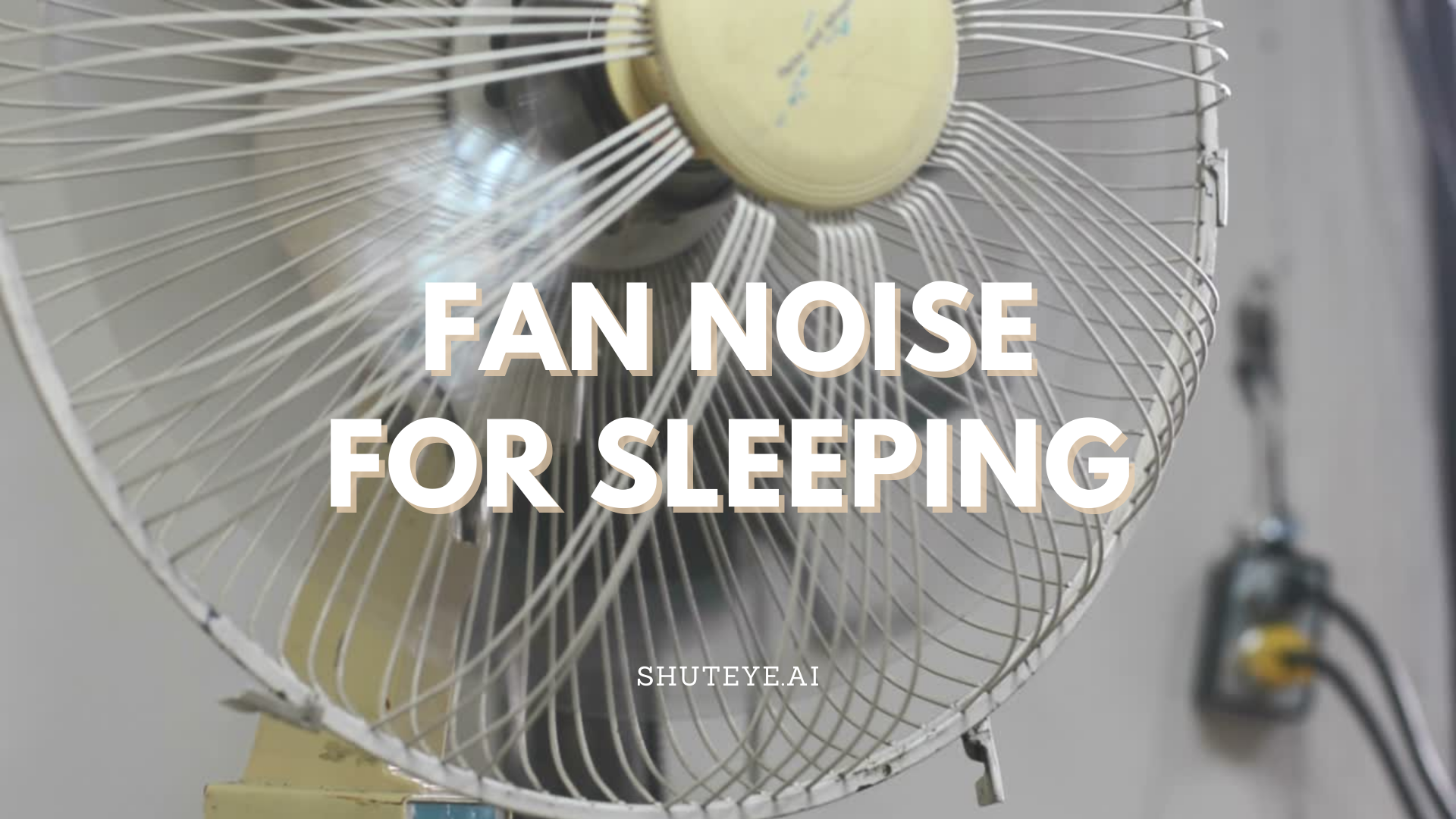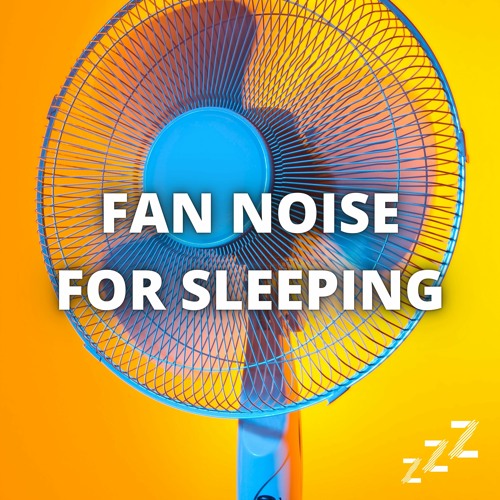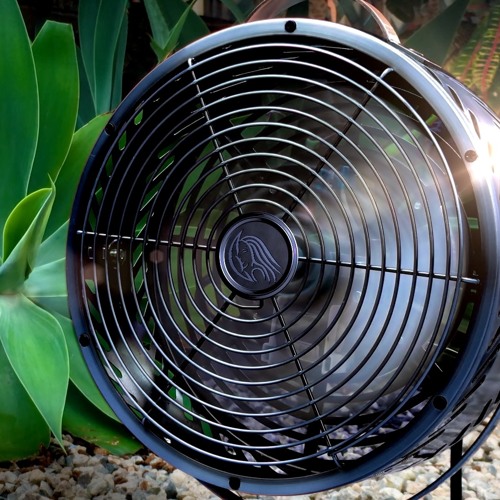Hey there, sleepyhead! Ever wondered why you sleep better when the fan's humming softly in the background? Well, let me tell you, fan noise for sleeping is more than just a gentle breeze—it's like a lullaby for your brain. Whether you're tossing and turning or just looking to upgrade your bedtime routine, this little trick might just change your life. So grab your favorite pillow, and let's dive into the world of fan noise for sleeping!
You know that feeling when you're lying in bed, and everything's silent except for the sound of your own thoughts? Yeah, it's not exactly relaxing. But add a fan to the mix, and suddenly, it's like the universe is whispering sweet nothings to help you drift off. Fan noise for sleeping isn't just about comfort—it's science, my friend, pure science.
Now, before we get too deep into this, let's talk about why it matters. Sleep is one of the most important things you can do for your health, and anything that helps you sleep better deserves some serious attention. So whether you're dealing with insomnia, noise sensitivity, or just want to level up your sleep game, keep reading. We're about to break it all down for you.
Read also:Jessica Bowman Rising Star In The Spotlight
What is Fan Noise for Sleeping Anyway?
Let's start with the basics. Fan noise for sleeping is essentially the soothing hum or whirring sound that a fan makes when it's running. It's not just background noise—it's a form of white noise that can help mask other sounds and create a peaceful environment for better sleep. Think of it like nature's playlist, but with a little extra oomph.
Here's the deal: when you're trying to sleep, your brain is super sensitive to sudden or unexpected noises. That could be anything from your neighbor's dog barking to the sound of a car driving by. Fan noise acts as a buffer, smoothing out those disruptive sounds and giving your brain something consistent to focus on instead. It's like wrapping your bedroom in a warm, comforting blanket of sound.
Why Fan Noise Stands Out
So why choose fan noise over other types of white noise? Well, for starters, it's natural. Unlike some electronic white noise machines, a fan creates a real, organic sound that's easy on the ears. Plus, it comes with the added bonus of actual airflow, which can be super refreshing, especially during warmer months.
- Fan noise is consistent and predictable, making it perfect for sleep.
- It's cost-effective—most people already have a fan lying around.
- It provides both auditory and physical comfort, thanks to the gentle breeze.
The Science Behind Fan Noise and Sleep
Alright, let's get nerdy for a second. There's actual science behind why fan noise works so well for sleep. When you're exposed to white noise, like the sound of a fan, it helps to flatten the sound spectrum in your environment. This means that sudden or loud noises are less likely to wake you up because they're drowned out by the consistent hum of the fan.
But here's the kicker: white noise doesn't just mask sounds—it also helps to calm your nervous system. Studies have shown that exposure to white noise can reduce the time it takes to fall asleep and improve overall sleep quality. So if you're someone who struggles with falling or staying asleep, fan noise could be your new best friend.
How Fan Noise Affects Your Brain
When you hear the sound of a fan, your brain starts to relax. It's almost like the sound is telling your brain, "Hey, everything's cool here. You can chill." This relaxation response is key for falling asleep quickly and staying asleep throughout the night.
Read also:Daisy Phoenix Rising Star In The Spotlight
Plus, fan noise can help regulate your body's internal clock. The steady rhythm of the sound can signal to your brain that it's time to wind down, making it easier to transition from wakefulness to sleep. It's like setting a bedtime routine for your ears!
Choosing the Right Fan for Your Sleep Needs
Not all fans are created equal, especially when it comes to sleep. If you're thinking about using a fan for noise, you'll want to choose one that's specifically designed for quiet operation. Look for fans with adjustable speeds and settings so you can customize the sound to your liking.
Here are a few things to consider when choosing a fan for sleeping:
- Noise level: Some fans are louder than others, so make sure to check the decibel rating before you buy.
- Airflow: You'll want a fan that provides a gentle breeze without being too overwhelming.
- Size: Depending on the size of your room, you might need a larger or smaller fan.
Types of Fans to Consider
There are a few different types of fans that work well for sleep:
- Tower fans: These are great for small spaces and often come with quiet modes.
- Ceiling fans: If you already have one, you can adjust the speed to create the perfect level of noise.
- Box fans: These are affordable and versatile, though they might be a bit louder.
Creating the Perfect Sleep Environment
Fan noise is just one piece of the puzzle when it comes to creating the ultimate sleep environment. To get the most out of your fan, you'll want to make sure the rest of your bedroom is set up for success. Here are a few tips:
First, keep your room cool. Studies show that cooler temperatures can help improve sleep quality, so having a fan running can make a big difference. Next, consider investing in blackout curtains to block out light and further reduce outside noise. Finally, make sure your mattress and pillows are comfortable and supportive. After all, you want to feel as cozy as possible when you're drifting off to dreamland.
Combining Fan Noise with Other Sleep Aids
For an extra boost, you can combine fan noise with other sleep aids like essential oils or sleep masks. Lavender oil, for example, is known for its calming properties and can enhance the relaxing effects of fan noise. Similarly, a sleep mask can help block out light and create a more peaceful environment.
Benefits Beyond Better Sleep
Using fan noise for sleeping isn't just about getting a good night's rest—it can also have other benefits for your overall health and well-being. For one, it can help reduce stress and anxiety by creating a calming atmosphere. It can also improve air quality in your bedroom by circulating fresh air, which can be especially helpful if you suffer from allergies or respiratory issues.
Plus, fan noise can be a great tool for parents with young children. If you're dealing with a fussy baby or toddler, the sound of a fan can help soothe them and encourage better sleep habits. It's a win-win for everyone in the household!
Long-Term Health Benefits
Getting enough quality sleep is essential for maintaining good health, and using fan noise can help you achieve that goal. Over time, better sleep can lead to improved mood, increased energy levels, and even better cognitive function. So while it might seem like a small change, incorporating fan noise into your bedtime routine can have big payoffs in the long run.
Common Misconceptions About Fan Noise
There are a few myths floating around about fan noise that we need to clear up. One of the biggest is that fans can be harmful to your health. While it's true that sleeping with a fan on high speed in a closed room can dry out your skin or cause dehydration, using it on a low or medium setting is perfectly safe. Just make sure to drink plenty of water and keep a humidifier nearby if needed.
Another misconception is that fan noise is only effective for certain types of sleep issues. The truth is, it can benefit just about anyone who struggles with noise-related sleep disturbances. Whether you're dealing with snoring partners, loud neighbors, or just a generally noisy environment, fan noise can help create a more peaceful space for rest.
Debunking the Myths
Here are a few more myths about fan noise and the truth behind them:
- Myth: Fans can cause "fan death." Truth: This is a myth that originated in South Korea, but there's no scientific evidence to support it.
- Myth: Fan noise is only useful for light sleepers. Truth: Even deep sleepers can benefit from the consistent hum of a fan.
Conclusion: Time to Upgrade Your Sleep Game
So there you have it, folks—fan noise for sleeping is more than just a cool breeze; it's a powerful tool for better rest. Whether you're dealing with insomnia, noise sensitivity, or just want to improve your overall sleep quality, incorporating fan noise into your bedtime routine could be the answer you've been looking for.
Remember, the key to getting the most out of fan noise is to choose the right fan for your needs and create a sleep environment that supports relaxation and comfort. And don't forget to combine it with other sleep aids like essential oils or blackout curtains for an extra boost.
Now it's your turn—have you tried using fan noise for sleeping? Let us know in the comments below, and be sure to share this article with anyone who could benefit from a better night's rest. Sweet dreams!
Table of Contents


